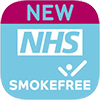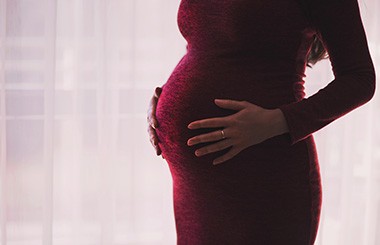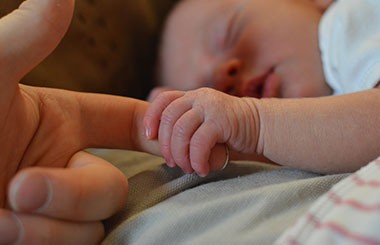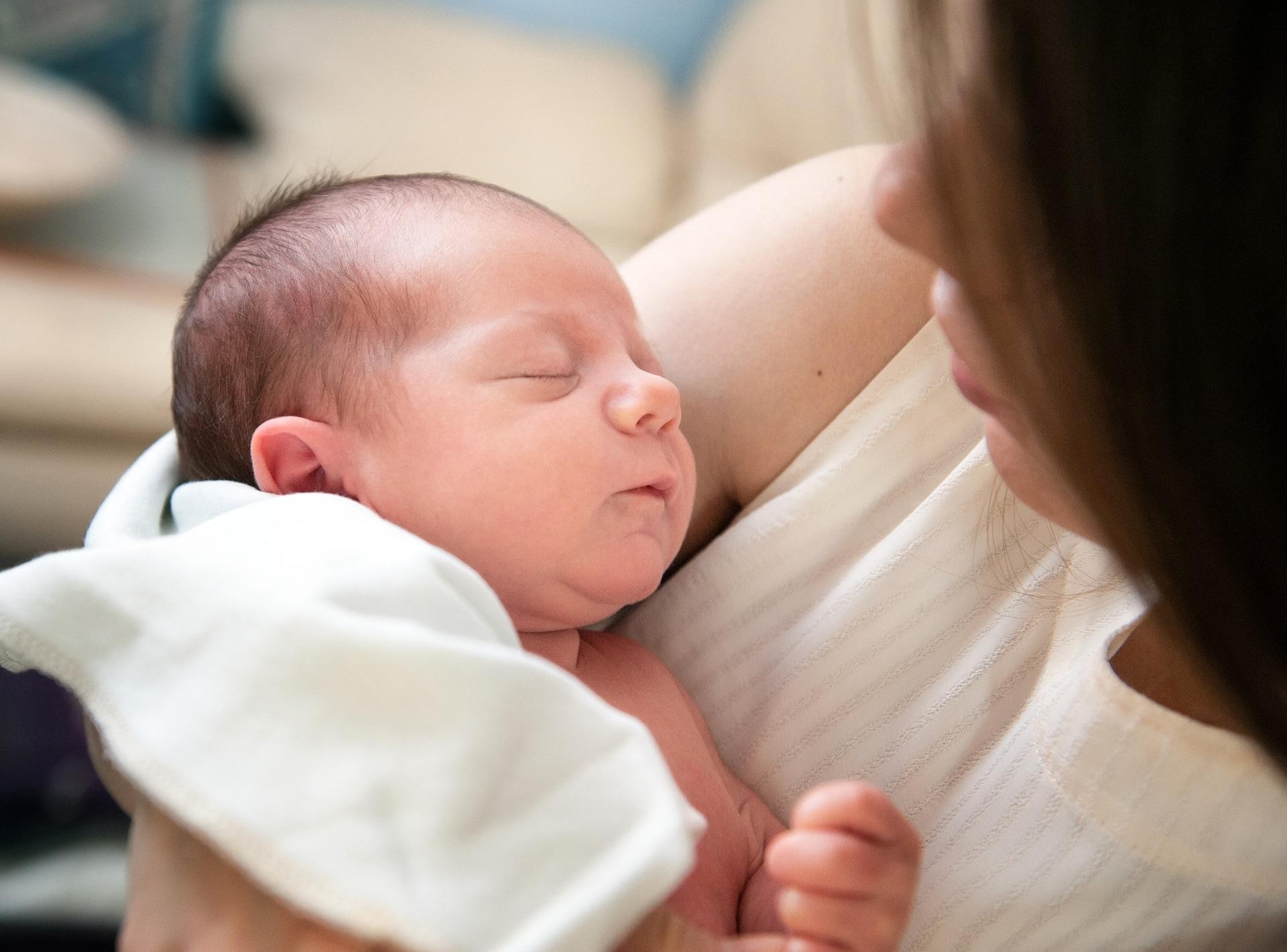On this page…
Our service can support the whole family to recognise their physical and emotional health needs.
Being active has many benefits for your health including:
- Helping maintain a healthy weight
- Improving sleep
- Helping to manage stress
- Reducing the risk of Type 2 Diabetes, heart disease, depression, joint and back pain, and cancer
It's recommended that adults have at least 150 minutes of moderate intensity or 75 minutes of vigorous intensity exercise per week, but every minute counts!
For general information and tips on how to eat well and move more you can visit the NHS Better Health, Healthier Families website. To find local activities and clubs you can visit the Staffordshire Connects or Stoke City Council - Libraries, sports and leisure websites.
Exercise after having a baby
After giving birth your ligaments are soft so it may be best to avoid high impact sports for the first 6 weeks, but you can begin gentle exercise such as walking or yoga as soon as you feel up to it.
It's important to continue pelvic floor exercises as soon as possible after giving birth. Pelvic Floor Exercises strengthen the muscles that help you control your bladder and bowel, and support your pelvic organs, helping to prevent incontinence and prolapse.
If you're worried about your pelvic floor and have pain, discomfort and/ or incontinence please speak to your Midwife or Health Visitor.
The Specialist Pelvic Health team at MPFT bring you a detailed video guide on how to do effective pelvic floor exercises, and give you some tips for fitting them into your daily routine.
Resources
Breast self-examination is a simple procedure which only takes ten minutes of your time. You should get to know your breasts – how they normally look and feel – so that you can detect any recent changes. For further information visit the NHS webpages 'How should I check my breasts?'
If you’re male and aged 15+, a simple monthly self-check will give you the best chance of noticing any problems early and of beating testicular cancer, should it ever happen to you. For further information check out the webpages 'What should my testicles look and feel like? or 'it's in the bag'.
We provide a range of sexual health services for people living in Stoke-on-Trent and Staffordshire, including free condoms, contraception sexual health testing and more. For more information visit the Sexual Health service page.
Domestic abuse is common in the UK and anyone can be a victim, regardless of gender, age, ethnicity, socio-economic status, sexuality or background. Visit our Safeguarding site for further information and support.
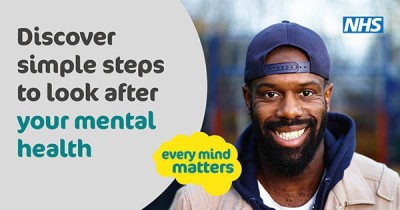
NHS Every Mind Matters gives you simple and practical advice to get a healthier mind and get more out of life – from how to deal with stress and anxiety, to boosting our mood or sleeping better. It will help you spot the signs of common mental health conditions, get personalised practical self-care tips and information on further support. You'll also learn about what you can do to help others.
Ask for help and support, you are not alone. Your family GP, Health Visitor/ School Nurse are there for you and can provide help and support. Staffordshire and Stoke-on-Trent Talking Therapies provide one easy point of access. They offer help with anxiety, low mood and coping with physical health conditions - you can self refer either online or by telephoning 0300 3030 923.

Having a new baby can be an exciting time for new parents, but it can also be extremely hard. It is natural to experience a range of emotions. However if you are feeling sad and anxious and it is starting to affect your relationship with your partner, family and baby, the Health Visiting Team can help you.
1 in 5 women experience depression and anxiety during pregnancy and in the year after birth... fathers and partners can experience this too.
Feeling anxious or depressed can affect your enjoyment of life, your relationship with your baby and your family. Parents of all ages, from all backgrounds and ethnic groups can be affected.
Thinking about the last 2-4 weeks, have you often felt:
- Nervous, anxious or on edge and unable to stop or control your worrying ?
- Down, low in mood or have little or no hope that life can feel better than it does at the moment?
- Little interest or pleasure in doing things that you have previously enjoyed
Lots of parents may feel this way, you are not alone.
If you have experienced any of these, please contact us for a chat or to arrange an appointment with one of our team. We are specially trained to help you and to find the support or treatment you may need. Our contact details are at the bottom of this page.
Self help tips
- Make time for rest and relaxation.
- Take regular gentle exercise.
- Remember to eat regularly as low blood sugars can make you feel worse.
- Eat a healthy, well-balanced diet.
- Avoid alcohol and recreational drugs.
- Reach out to friends and family for support.
- Sleep when you can.
- Engage in social activities with your baby and meet with other mothers, perhaps a walk in the park or a virtual meet up.
- Talk about how you feel to someone you can trust, a partner, relative, friend or health professional.
- Don’t try and do everything at once, make a list of things to do and set realistic goals.
- Be honest with health professionals about how you feel.
Resources
We have produced a leaflet which includes the information from above and links to other helpful resources and support services:
Websites
- Maternal Mental Health Alliance
- Staffordshire and Stoke-on-Trent Talking Therapies
- Every Mind Matters - NHS
- BBC Tiny Happy People - New dads
- PANDAS - PND awareness and support
- Mind
Videos
You are not alone...

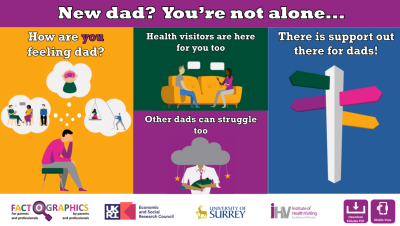
Further Resources:
- PATH - Looking after yourself - dads, co-parents and partners - information for new parents
- Understanding your mental health and emotional wellbeing following the birth of your baby (fathers) - an information leaflet from the Institute of Health Visiting
DadPad®
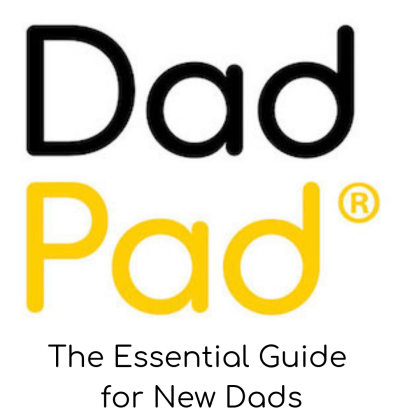
The app aims to help new dads develop their confidence and practical skills needed to meet their babies’ physical and emotional needs. Building a strong attachment will help dads enjoy their new role but will also contribute towards positive long-term social, health and educational outcomes for their babies.
Crucially, the app also provides dads with guidance on how to support and seek help (when needed) for their partners and themselves as they adjust to their new role, and cope with the physical and emotional strains that this can place on individuals and relationships.
The app covers topics such as:
- Feeding, holding, changing and cleaning your baby.
- Surviving without sleep and coping with crying
- Getting to know your baby
- Home safety and first aid
- Looking after yourself and supporting your partner
For more information and to download the app follow the link: DadPad app
Activities and wellbeing sessions
Whether it’s to discuss everything football and Stoke City FC related or simply to just grab a cuppa and listen in to the conversation you can stay connected to Stoke City and your team, with its Let’s Talk Football sessions. For more details click Let’s Talk Football – Stoke Community Directory
The Potters Health Hub offers an opportunity to come into a safe place and speak about your physical and mental wellbeing. For more details click Potters Health Hub – Stoke Community Directory.
